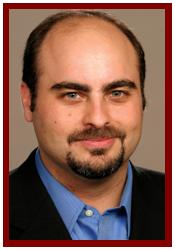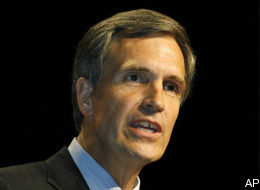By Bradford Queen, Managing Editor, on Mon Aug 13, 2012 at 3:00 PM ET The Politics of Media
Paul Ryan edition:
Following the announcement of Paul Ryan as Mitt Romney’s choice for the VP slot on Saturday morning, the campaign says it chose what would generally be considered an odd time to break the news because “we’re in a 24-7 news cycle.” [WSJ] [NYTimes] [The Washington Post]
TVNewser has a good recap of how the networks covered the Norfolk, Va. campaign event. [TVNewser] But, the Twitters were buzzing long before the Saturday morning event. [Mashable]
CBS’s ’60 Minutes’ and Bob Schieffer scored the first joint interview with Romney and Ryan. [CBS]
The Fox News/News Corp. patriarch Rupert Murdoch endorsed the Ryan pick on Twitter. [@rupertmurdoch]
In other news, CNN’s Sunday line-up looked different over the weekend after the cable network suspended Fareed Zakaria following the journalist’s admission to plagiarism last week. Zakaria recent column for TIME – which has also suspended him – that included portions that appeared to mirror a piece in April’s issue of The New Yorker. [NYTimes]
By Robert Kahne, RP Staff, on Mon Aug 13, 2012 at 1:30 PM ET  I have to object pretty strongly to Jonathan’s first reason for liking the Paul Ryan pick–I believe the characterization of Paul Ryan as a policy wonk is an affront to policy wonks of all stripes. I have to object pretty strongly to Jonathan’s first reason for liking the Paul Ryan pick–I believe the characterization of Paul Ryan as a policy wonk is an affront to policy wonks of all stripes.
As Mr. Allen very astutely characterized, Ryan is an ideologue–which is perfectly fine! He is a politician, that is the best thing for an ideologue to be! However, it frustrates me to no end when people say that Paul Ryan is driven by policy. He is clearly not.
Like most other people, he is driven by a set of core beliefs in which he has faith. They were also illuminated by Mr. Allen: tax cuts always stimulate, and government spending is fundamentally bad.
My biggest problem with Mr. Ryan is that he tries to use policy research and econometrics (my fields of study) to justify his beliefs. Here is an example of what frustrates me: when I was getting my Masters degree in public policy, we had a class which was essentially about how to be a non-partisan research staffer for a legislative branch. One of the lessons we had was about how to deal with policy makers who try to rig the rules of the game to get their research staffs to achieve the conclusions that they want, rather than conclusions that reflect reality. The example for the class? Paul Ryan. (The issue at hand was his 2010 “Roadmap”, for which he asked the CBO to ignore all possible economic effects of his tax cuts, because, as Mr. Allen states above, he believes tax cuts to be stimulatory.)
To me, Paul Ryan is Sarah Palin with a better education. His ideas are as conservative and (in my opinion) bad for the county, but he wraps them in fuzzy math to make them seem more palatable to the media adjudicators of our society–and is somewhat successful in doing that.
As somebody who spent a lot of time working hard to understand the economic effects of policy, nothing drives me more mad than seeing a trusted news person reading from a congressional white paper something that defies the basics of policy analysis.
Politically speaking, however, I think that the pick of Paul Ryan furthers my hypothesis that the 2012 election is exactly like the 2004 election–a prohibitive front runner during the challenging party’s primaries who the base really does not like running against a bunch of bad candidates who eventually and inevitably wins his party’s nomination to challenge a President with middling approval numbers but who is fiercely hated by the other party’s base, who chooses a running mate which his base absolutely adores but with whom the rest of the country is somewhat unimpressed. I see the end stacking up a lot like 2004–a clear, but close, reelection of the sitting President. (A fun game is trying to match up the primary candidates from 2004 with 2012–Gephardt-Gingrich, Cain-Dean, Bachmann-Mosely Braun, etc).
I think the pick was the best possible one Mitt Romney could have made. But, as a Democrat, I don’t like him.
By Ronald J. Granieri, on Mon Aug 13, 2012 at 11:00 AM ET  I agree with Tom that it is a shame that Romney feels the need to tack further to the right. I agree with Tom that it is a shame that Romney feels the need to tack further to the right.
I would go even further to say I am sorry that two smart people such as Romney and Ryan have so little regard for logic and good sense (and for the public’s intelligence) that they think no one will notice as they try simultaneously to decry debt and push plans that will only make it worse.
Meanwhile the President claims to care about entitlement reform but offers no plan.
Both sides are banking on the ignorance and biases of their most fervent supporters.
We get the leaders we deserve. Alas, Babylon.
By Jeff Smith, on Mon Aug 13, 2012 at 9:30 AM ET  Thanks for the very insightful analysis, Tom. Thanks for the very insightful analysis, Tom.
It’s hard to add much except to say this: You will hear the phrase “No one over 55 will be impacted” more than you heard Al Gore say “lockbox.” And of course from the other side you will hear the incessant “end of Medicare as you know it” refrain. The victor of that argument will likely win the election.
Amid annual trillion dollar deficits and the nation’s debt rating downgrade, I suspect that Americans are somewhat more willing than before to hear a serious conversation about our nation’s troubled finances.
But in order to prevail in that argument, Romney must tweak the Ryan plan to reduce the benefits for the wealthy and shift money towards deficit reduction. Only then would he be able to capture the moral high road.
However, doing so would alienate the very conservative pundit class that the Ryan pick has appeased, which is why I find it quite unlikely.
By Tom Allen, on Mon Aug 13, 2012 at 9:00 AM ET  I served with Paul Ryan for 10 of my 12 years in Congress, and 4 years together on the House Budget Committee. I served with Paul Ryan for 10 of my 12 years in Congress, and 4 years together on the House Budget Committee.
Paul is bright, pleasant, hard-working—a real gentleman.
But he is also an ideologue, inspired by Ayn Rand, fiercely opposed to federal spending and a passionate believer in the power of tax cuts to stimulate economic growth in all circumstances.
The budget proposals he has presented the last three years reduce taxes for the wealthy, and services (and tax breaks) for the middle class.
Ryan is a small government conservative; not a deficit hawk.
Ryan is also a high risk choice for Romney; his campaign must be gambling that Ryan’s ideas will not be well enough understood to hurt Romney’s chances. Since ideas get trivialized and trampled by media coverage anyway, they may be right.
It is a sad commentary on our dysfunctional politics that the Republican nominee felt he had to choose someone on the right wing of the party rather than reach out to the middle of the electorate.
By Jonathan Miller, on Mon Aug 13, 2012 at 8:30 AM ET 1. Maybe, just maybe, the presidential debate will turn substantive: The past few weeks have seen some of the most disgusting and despicable campaign charges in recent memory — from the Obama Super PAC implying that Romney killed a man’s wife to Romney’s completely mendacious claim that Obama is eliminating the work requirement from Bill Clinton’s welfare reform. The choice of Paul Ryan places his economic policy vision on the front stage, and allows the country to witness a thorough, meaningful debate on whether FDR’s Welfare State should survive this Age of Austerity. It will also put in clear focus one of the critical themes of modern America — growing income inequality — and I hope will force the Obama campaign to develop concrete plans to deal with it.
2. Mitt Romney’s campaign could be the next victim of the “Aspen Curse”: As an Obama supporter, it is comforting to know that the “Aspen Curse” — which victimized me and so many of my friends — could turn on Mitt Romney. As I detailed in this piece a few months ago, I was the member of the Inaugural Class of the Aspen Institute’s Rodel Fellows program, that brought together young political leaders from across the country for bipartisan dialogue. Unfortunately, every one of us that sought major statewide office over the next several years lost — from contributing RP Michael Steele to New Jersey’s Tom Kean to Missouri’s Robin Carnahan to most recently Nebraska’s Jon Bruning. Paul Ryan, and seven other young incumbent Congressman, were originally named to our class; but due to their busy schedules and strict Congressional ethics rules, Aspen dropped Congressmen from the program. Still, the Aspen Curse victimized sorta-Rodel-Fellows Florida’s Kendrick Meek when he ran for the U.S. Senate and contributing RP Artur Davis when he ran for Alabama’s Governor. So maybe too Paul Ryan will meet the same fate.
3. It demonstrates that the Romney campaign is in trouble. As nearly every insta-analyst of the pick has agreed, Paul Ryan was the riskiest pick among the VP finalists, which included former Minnesota Governor Tim Pawlenty, and my spring prediction, Ohio Senator Rob Portman. Romney and his campaign have been playing it safe since the beginning of the primary season, avoiding controversy whenever possible. The Ryan pick indicates that they felt they needed to shake up the dynamic that has Obama up 7-9 points in national polls, despite their looming cash advantage.
4. It is great news for Centre College in Danville, Kentucky. The tiny, extraordinary school, which hosted the 2000 Vice-Presidential debate, will get its second chance to be in the world’s spotlight this fall. Having a debate between two bright, spirited men, with deeply contrasting visions of the country’s economic future, will lift the debate in significance and historical weight. It will be another great moment for small town Kentucky.
5. It is great news for my daughter, Emily. Of course, I personally view this as #1. As Emily heads next week to freshman orientation at Miami University in Oxford, Ohio, her outstanding choice of higher education will rise in national attention as the alma mater of the GOP Vice Presidential nominee. Moreover, I’m thrilled that the presidential campaign will become a central part of campus dialogue, making Emily’s first experience in the voting booth — casting her ballot for Barack Obama — all the more special.
6. (UPDATED) Of the four men on the two major presidential tickets, the only Protestant is the..uh..”Muslim”
By RP Staff, on Tue Aug 7, 2012 at 9:15 AM ET Is this picture:
A. A Powerful Indictment of Public Breastfeeding Opponents?
B. A Cheap Apples-to-Oranges (pun NOT intended), Unfair Comparison?
C. A Transparent Attempt by the RP Staff to generate traffic to this Web site?
By Jonathan Miller, on Tue Aug 7, 2012 at 8:30 AM ET  Ted Cruz’s Senate win in Texas was no upset by the time he pulled it off, and for all of the necessary public posturing from David Dewhurst’s camp, it would taken scandal or a natural disaster to arrest Cruz’s momentum. Every atmospheric detail favored Cruz, from his assiduous courting of the state’s Tea Party activists while Dewhurst confused checks from the Texas GOP establishment with a voter base; to the edge primaries usually confer on insurgent candidacies; to the fact that Cruz demonstrated a quick learning curve as a first-timer, while Dewhurst had not run a competitive race in about a decade. Ted Cruz’s Senate win in Texas was no upset by the time he pulled it off, and for all of the necessary public posturing from David Dewhurst’s camp, it would taken scandal or a natural disaster to arrest Cruz’s momentum. Every atmospheric detail favored Cruz, from his assiduous courting of the state’s Tea Party activists while Dewhurst confused checks from the Texas GOP establishment with a voter base; to the edge primaries usually confer on insurgent candidacies; to the fact that Cruz demonstrated a quick learning curve as a first-timer, while Dewhurst had not run a competitive race in about a decade.
There will be a substantial case made today, as Ed Kilgore already has in The New Republic, that Cruz’s win is primarily emblematic of the ongoing internal coup in Republican ranks by far-right, anti-accommodation jihadists. It’s certainly right that Dewhurst was tabbed as an Austin insider who was too cozy with the state’s ruling class, but it’s hard to attribute that line of attack to a particular ideological mantra—especially in this case, when by Kilgore’s own account, Dewhurst had no real ideological apostasies for Cruz to tout. While much of the mainstream commentary tries to have it both ways, assuming Cruz’s win proves the hard-right tilt of GOP primaries and simultaneously conceding Dewhurst’s conservative bona fides, it’s at most more likely, and at least worth considering that Cruz’s outsider status mattered considerably more than litmus tests.
 Recognizing that the Texas race was one between two mainline conservatives and not a reprise of, say Christine O’Donnell and a avowed moderate like Mike Castle, upends a certain narrative about tea partiers in Texas and elsewhere. It’s a liberal article of faith that the Tea Party’s rise is fueled by a militancy that would level government to the ground; in reality, it’s much more a symptom of an altogether plausible conclusion—that government at every level has veered off course, lost touch with popular sentiment, fallen into the grip of monied interests, and struggled to deliver even core public services. In other words, a gripe that liberals themselves sound often enough, and hardly one outside the realm of regular political discourse. Recognizing that the Texas race was one between two mainline conservatives and not a reprise of, say Christine O’Donnell and a avowed moderate like Mike Castle, upends a certain narrative about tea partiers in Texas and elsewhere. It’s a liberal article of faith that the Tea Party’s rise is fueled by a militancy that would level government to the ground; in reality, it’s much more a symptom of an altogether plausible conclusion—that government at every level has veered off course, lost touch with popular sentiment, fallen into the grip of monied interests, and struggled to deliver even core public services. In other words, a gripe that liberals themselves sound often enough, and hardly one outside the realm of regular political discourse.
Read the rest of…
Artur Davis: What Liberals Are Missing About Ted Cruz
By RP Staff, on Mon Aug 6, 2012 at 11:00 AM ET Rich Copley, culture editor for the Lexington Herald-Leader, shared his well-considered thoughts on the Chick-Fil-A controversy, and just so happened to quote a semi-famous recovering muser:
The idea of ideological consumerism was lampooned on The Daily Show earlier this week in a sketch in which comics Wyatt Cenac and Jessica Williams sat down with host Jon Stewart to discuss the controversy.
Williams, representing the conservative point of view, chows down on a Chick-fil-A sandwich, and when Stewart attempts to have a bite, Cenac smacks it out of Stewart’s hands, saying, “Liberals buy liberal products!”
A moment later, when Cenac pulls out his iPhone, Williams complains that she wants one but won’t buy it because Apple supports gay marriage. Cenac laughs, then Stewart points out that Apple has some “labor issues,” referring to complaints about practices in its Chinese factories. Then he says Chick-fil-A does good things for its workers, including paying for them to go to college.
At the end of the bit, Cenac concludes that he can eat at Chick-fil-A in good conscience, as long as he follows it with some Ben & Jerry’s, and Williams decides to buy an iPhone and load it with tunes by right-wing rocker Ted Nugent.
On former state treasurer Jonathan Miller’s Recovering Politician blog, former Kentucky secretary of state John Y. Brown III, son of former governor and chicken magnate John Y. Brown Jr., joked, “This creates a frenzy among the remaining fast-food chicken chains to see who will try to appeal to the gay-friendly chicken-eating population.”
In the end, everyone needs to act on his or her own conscience. If you strongly support gay marriage, you probably will find it hard to go to Chick-fil-A. But if you start researching the fast-food joints surrounding our local Chick-fil-As, you might find some politics that are equally disturbing or affirming, depending on your leanings.
Click here to read the full piece.
By Bradford Queen, Managing Editor, on Mon Aug 6, 2012 at 10:00 AM ET The Politics of Media
CBS is seeing new revenue from digital properties. Les Moonves is called a “super genius” for his leadership of the network. [CNBC]
Reuters News’s popular opinion blog was hacked on Friday by an anonymous person who posted false information about the situation in Syria. The news organization took down the page while they investigated. [NYTimes]
NBC spoke about the future of Olympics coverage in a call with reporters late last week. The network’s execs also said the London games are the most watched ever in the U.S. [Reuters]
People using laptop and desktop computers are spending smaller amounts of time on NYTimes.com, according to new Nielsen figures. [Poynter]
The Republican leader in the U.S. Senate, Mitch McConnell, is cheering the rise of social media. [BuzzFeed]
|
The Recovering Politician Bookstore
|














